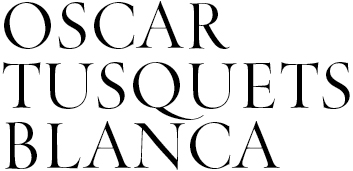Leggiadria
Gillo Dorfles. Design Theorist. Trieste, Italy, 1910
I do not know whether the Spanish or Catalan languages have an exact equivalent for the Italian word “leggiadria”, which means: grace and lightness, but also elegance, moderation, and balance - all combined with vivacity. / Why does this word always come to mind whenever I think of Oscar? Because, more than almost anyone else - in the world of artists, architects and designers - Oscar has always been able to reconcile duty and pleasure, precision and fantasy, seriousness and irony. / I am not thinking of his design work only - from chairs to cutlery, from domestic items to utensils - always rigorous, yet always light, never overbearing or pedantic; his architecture also, functional yet graceful, sometimes rigorous (the Las Palmas Auditorium, for instance) but with unexpected ornamental touches; often stereometric but with unique openings; I am thinking of a garden such as that of the Casa del Laberinto, where a number of geometric forms are set into the exuberant vegetation. And I am also thinking of the celebrated restaurant Azulete, where I remember having eaten once under those glass roofs, in an idyllic atmosphere ensuring the tranquil digestion of even the most copious meal. / I do not wish to prolong my “homage” to Oscar with futile and tedious exercises in critical analysis; however, there can be no doubt that in contrast with much of recent Spanish architecture - which often does not seem capable of shaking off the memory of International Style - or indeed the work of several other contemporary masters, Oscar has managed to inherit the fantasy of the great Catalan Modernists (we need only think of his sensitive restoration of the Palau de la Música), yet he mitigates this with a call to functional order. This is a characteristic which pervades all his architecture, and above all, his design, but also his behaviour and spirit. It is this extraordinary, ironic and jovial “leggiadria” which truly distinguishes him.







